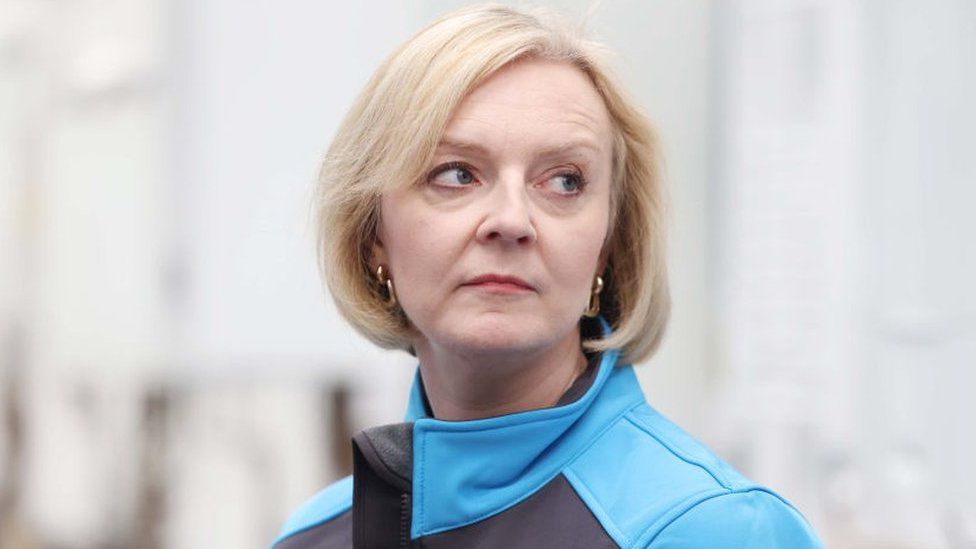ARTICLE AD BOX
By Lora Jones
Business reporter, BBC News
 Image source, Getty Images
Image source, Getty Images
Prime Minister Liz Truss is under pressure after a week of economic turmoil in the markets
Prime Minister Liz Truss has admitted that there has been "disruption" in the UK economy following the mini-budget.
After unveiling £45bn of tax cuts funded by borrowing last week the pound slumped and the Bank of England spent billions shoring up pension funds.
Writing in The Sun, she insisted the government had "acted decisively" to help people with the cost of living.
But the announcements were not accompanied by the usual economic forecasts, which spooked investors.
She has resisted calls to bring forward publication of the independent fiscal watchdog's assessment of her tax plans.
The PM said she was "committed" to publishing the Office for Budget Responsibility (OBR) forecast on 23 November, the same day the chancellor is due to set out further economic plans.
But some Conservative MPs want to see this sooner in order to reassure financial markets.
The Treasury argues it should wait until additional changes are announced.
Writing on Friday, Ms Truss said: "I am going to do things differently. It involves difficult decisions and does involve disruption in the short term."
She also reiterated her commitment to "get the economy growing", with plans to stimulate growth expected to include measures in eight areas - business regulation, agriculture, housing and planning, immigration, mobile and broadband, financial services, childcare, and energy.
And she insisted she would maintain an "iron grip on the national finances".
Last week, Chancellor Kwasi Kwarteng set out some of the government's tax and spending plans - including support for people facing high energy bills and a surprise announcement that it would scrap the 45% highest tax band for high earners.
However, his mini-budget was not accompanied by a forecast from the OBR, something which helped to fuel market turmoil.
After a meeting between Ms Truss, Mr Kwarteng and the OBR on Friday morning, the government confirmed the rest of its economic plans would be published on 23 November, alongside an OBR forecast.
Writing in the Telegraph newspaper, the chancellor insisted it would include a "credible plan" to get the public finances back on track.
"The British taxpayer expects their government to work as efficiently and effectively as possible, and we will deliver on that expectation," he said.
Image source, PA Media
Image caption,Leading members of the Office of Budget Responsibility arriving at 10 Downing Street for a rare meeting with the prime minister
Senior minister Simon Clarke said the government needed to explain more about how it would control spending, as well as boosting economic growth.
"We have acquired spending habits that outstrip our ability to pay for it. That needs to change," he said.
Waveney MP Peter Aldous said the timing of last Friday's plan had been "hopelessly wrong", and the rest of the details should be brought forward to October.
Elsewhere, Liberal Democrat leader Sir Ed Davey argued that the government, by waiting until 23 November, was allowing the UK economy to "fly blind" for two months.
"Families and businesses can't afford to wait any longer for this government to fix their botched, unfair budget," he said.
What is the Office for Budget Responsibility?
The Office for Budget Responsibility is the independent watchdog for the government's finances.
It usually produces economic forecasts twice a year, to accompany each autumn budget and spring statement.
It scrutinises government plans, to increase taxes or borrowing for example, and predicts what the likely impact on the overall economy will be.
These forecasts are so important because a strong one gives investors confidence to put money into the UK economy - whereas a weak one is likely to have the opposite effect.
The government can request forecasts from the OBR at any time to get independent advice on big moves.
But it did not take the OBR up on its offer ahead of last week's mini-budget. This is thought to have undermined confidence in the markets.
This led to the pound dropping to its lowest rate against the dollar in 37 years on Monday, before returning to its previous level.
The lack of an OBR forecast to accompany last week's mini-budget from the government has been seen as one of the reasons for recent turmoil on the financial markets.
It had offered to prepare a draft forecast in time for the mini-budget, but it was not taken up.
The government's tax-cutting plan faced criticism from the International Monetary Fund as a result and the pound dropped to a 37-year low of $1.03 on Monday.
On Friday, sterling rose to $1.12 - close to the level the currency was at before the mini-budget was announced.
Despite that, the ratings agency Standard & Poor's cut the outlook for its AA credit rating for British government debt from "stable" to "negative" on Friday, because of the prospect of higher borrowing needed to fund the pledges.
In recent days, the Conservatives have posted some of their worst opinion poll ratings in more than 20 years.
A poll published on Thursday by Survation put the party on 28%, more than 21 points behind Labour, while a separate survey by YouGov put the Tories on 21%, 33 points adrift.
Labour's shadow business secretary Jonathan Reynolds said ministers should "get back to Parliament, revoke the changes, and start again to try and rebuild confidence".
And Conservative MP Martin Vickers urged the prime minister not to scrap the 45p tax rate and the bankers' bonus cap, describing the move as "a political own goal".
However, another Tory backbencher, Andrea Leadsom, said the mini-budget was "unashamedly pro-growth", and that the markets were "wrong to be jittery" about the changes.

 2 years ago
19
2 years ago
19








 English (US) ·
English (US) ·